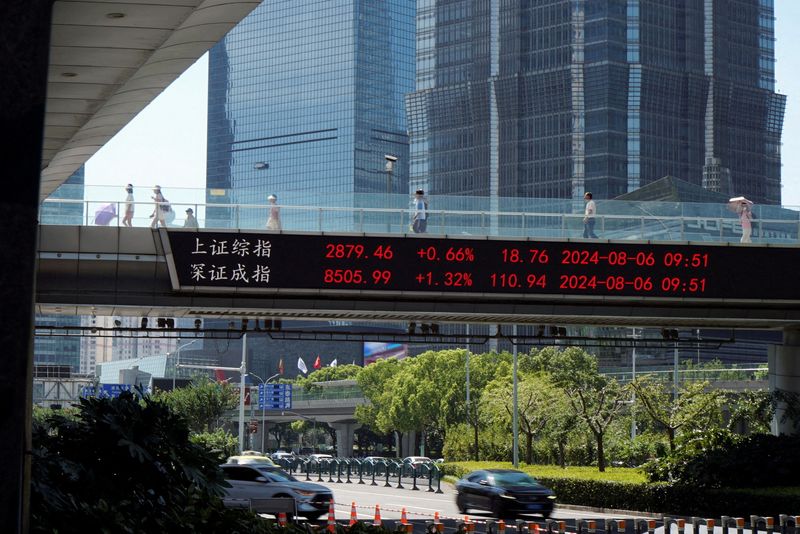SHANGHAI (Reuters) - China's abrupt and ferocious stock market rally has slammed some of the country's biggest hedge funds, forcing them to hastily cover short positions and take losses on their bets in the heavily regulated derivatives market.
Beijing X Asset Management, Techsharpe Quant (Beijing) Capital Management and Shenzhen Chengqi Funds are among the funds sideswiped when China's struggling stocks recovered a quarter of their value in less than a week in late September, following a raft of stimulus measures.
Their losses stemmed from short positions in China's stock index derivatives, which market-neutral fund strategies perforce use to hedge equity holdings.
Market euphoria as China showed serious intent to fix its ailing economy drove futures prices up sharply, causing losses on those positions that could not be offset by gains in cash holdings.
British hedge fund giant Winton's trend-following strategy was also upended by China's unexpected market reversal, forcing the firm to quickly unwind its bearish bets.
Regulators have clamped down on data-driven quant funds and tightened curbs on stock short-selling this year, rendering the market prone to wild swings, said Hu Bo, fund manager at Shanghai Professional Fund Management Co.
Hu said the drawdowns underscore the risk of relying too heavily on one strategy in China's moody market.
"Every strategy tends to hit the wall after a period of outperformance," Hu said. So, investors need to "embrace diversified investment strategies, and make more in-depth research."
Beijing X, which manages more than 10 billion yuan ($1.40 billion), recorded a drawdown - a peak-to-trough decline in value - of 5.6% in its hedging strategy in late September, according to broker data. Techsharpe suffered a drawdown of 5.2%, and Shenzhen Chengqi Funds 4.6%.
An index tracking China's "market neutral" strategies recorded a drawdown of 4.83% during the last week of September, and has barely recovered since. The correction is the second biggest in history, and rare for products designed to deliver absolute returns.
Chinese markets have been on a wild ride since Sept.24, when authorities unveiled rate cuts and policies aimed at salvaging this year's 5% economic growth target. The CSI300 index is up 20% since then.
"Quantitative strategies work only in a balanced market," said Tim Cao, a Shanghai-based hedge fund manager who is now switching to qualitative analysis. "In a crazy market, nearly all quant models become ineffective."
Winton declined to comment. Beijing X, Techsharpe and Chengqi Funds did not reply to Reuters' requests for comment.
QUANT QUAKE
Chinese index futures typically trade at a lower price than the stock indexes they are linked to, due to a shortage of tools that allow bearish short positions in mainland markets.
That perpetual discount turned overnight into a premium, dealing a blow to hedge funds.
On September 30, the spread between the CSI300 index futures and the underlying benchmark index shot up to 142.80 points, the biggest in nine years. That blow-out nullified funds' hedging strategies as futures no longer helped offset positions in the stock market.
The swift change in the trend also upset trend-following strategies, such as at Winton. An index tracking trend-following strategies posted its first weekly loss in a month.
Winton, which manages around 6 billion yuan in China, suffered a roughly 8% drawdown, according to investors.
The money manager told investors in a recent meeting that bearish bets on Chinese stocks, energy and base metals affected performance, according to a memo obtained by Reuters.
Short positions in stock index futures had been unwound, while bearish commodities bets had been slashed by a third, Winton told investors.
Hedge funds operating in China have faced such pressures before. In February, market liquidity in smaller stocks seized up in what some dubbed China's "quant quake".
Investors expect these funds will take time to recover. China Merchants Bank's wealth management unit asked investors to be patient, and advised them against redeeming the products in haste.
"For funds who were forced to close short positions due to margin calls, the wounds won't be healed anytime soon," said Yuan Yuwei, founder and CIO of Water Wisdom Asset Management.

($1 = 7.1226 Chinese yuan renminbi)
(This story has been refiled to add closing quotation mark in paragraph 8)